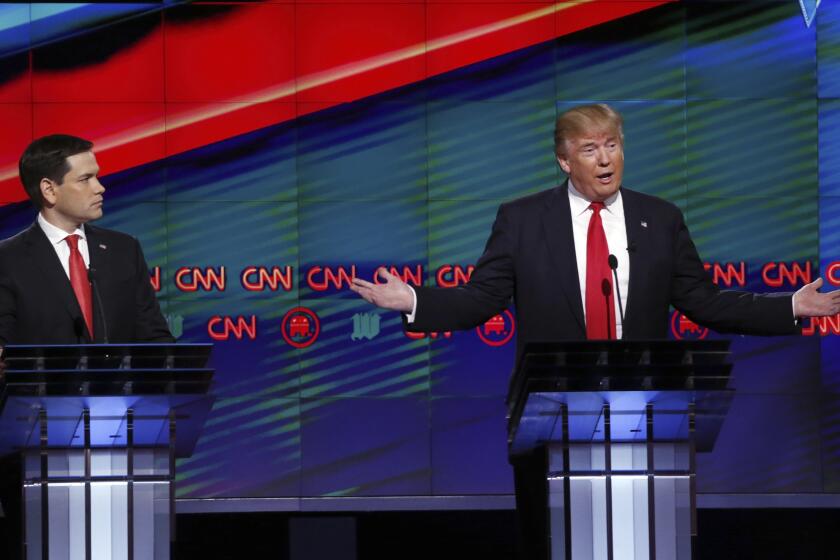Goldberg: The latest sign that Republicans are abandoning even their most deeply held principles
The changing of the conservative mind in recent years could hardly be captured more pithily than in the headline of a recent op-ed: “Why I believe in industrial policy — done right.” So opined Sen. Marco Rubio for the Washington Post and, at greater length, for National Affairs.
Note that I’m not addressing the conservative heart. Calling lawfully convicted violent criminals such as the Jan. 6 rioters “hostages” speaks more to the sad and profound changes of heart on much of the right.
What I’m referring to, rather, are the ideas, arguments and principles that once defined conservatism intellectually, among them rejection of the kind of government intervention in the economy that the Florida Republican now apparently favors.
Read more: Goldberg: Voters wishing for an alternative to Trump and Biden got one. Unfortunately, it’s RFK Jr.
Modern conservatism — the sort associated with Barry Goldwater, William F. Buckley, George Will, Thomas Sowell, Ronald Reagan and to some extent Rubio when he arrived in Washington — once regarded central economic planning and everything associated with it, including “industrial policy,” to be dangerous folly. Buckley’s 1955 mission statement for National Review declared: “Perhaps the most important and readily demonstrable lesson of history is that freedom goes hand in hand with a state of political decentralization, that remote government is irresponsible government.” He also noted that the “competitive price system is indispensable to liberty and material progress.”
This conviction can be traced back to Edmund Burke and Adam Smith, but it became a defining principle on the American right during the Cold War, against the backdrop of the rise of the Soviet Union as well as the domestic programs of Franklin Roosevelt’s New Deal and Lyndon Johnson’s Great Society.
There are many strands to the conservative argument against state efforts to shape the economy. One is the “knowledge problem,” a phrase adapted from Nobel Prize-winning economist Friedrich Hayek’s brilliant 1945 essay “The Use of Knowledge in Society.”
Read more: Goldberg: Trump and his MAGA movement stormed the Republican establishment. Now they have become it
The knowledge problem, simply put, is that society, including the market, is too complex and too dynamic for government experts to reliably direct it from afar. In a free market, prices capture information that even the best data-gatherers can’t. The closer you are to the problem, the closer you are to the solution.
Public choice theory — what another Nobel laureate economist, James M. Buchanan, called “politics without romance” — adds another layer of reasons to distrust central planning. Government experts and regulators are often “captured” by the industries or activists most affected by their policies. Also, once politicians get involved, policy priorities multiply — extending to boosting employment, expanding diversity, favoring certain states or districts, protecting specific industries and so on — and the government’s stated goals become pretexts for other motives. “Crises” — pandemics, war, unemployment, environmental problems — become excuses to reward favored constituencies.
Take President Biden’s recent announcement that he would rebuild Baltimore’s collapsed Francis Scott Key Bridge both “as rapidly as humanly possible” and “with union labor and American steel.” Well, which is it — rapidly or with those restrictions?
That brings us to Rubio. Take it from a longtime columnist, you can’t always blame writers for the headlines mischievous editors put on our articles. But “Why I believe in industrial policy — done right” perfectly captures the senator’s argument and the trouble with the broader right-wing fad for central planning.
Oh, you want to do it right? Well, that changes everything!
I mean, if only someone had told Hayek and Buchanan that their objections could be answered by just “doing it right.”
The change in the conservative mind goes beyond industrial policy. It’s really about the use of state power generally. Too many Republicans no longer have any problem — moral or otherwise — with government imposing its will on society, so long as the “right” people are doing it “right.” The knowledge problem, they seem to believe, is confined to the left wing.
This is the core conceptual failing of Rubio’s argument, but there are others.
We used to say the left invented crises and distorted facts to justify expanding government. The same can now be said of the right. Rubio suggests that until very recently, America embraced “unfettered free trade.” This is not only untrue but, as Reason’s Eric Boehm suggested, a particularly strange assertion by a leading defender of Florida sugar subsidies.
Rubio also states that American manufacturing has suffered “decades of neglect” and that the “collapse of American manufacturing has … done incalculable harm to our nation’s social fabric.” What collapse? While it’s true that U.S. industrial employment has declined — mostly thanks to automation, not trade — industrial output has been increasing for a century.
I agree with Rubio that we should spend more on defense for national security purposes. But Rubio wants such spending to also mend the nation’s social fabric and serve as a jobs program.
I don’t share the senator’s confidence that Washington could accomplish all that if only people like him were in charge.
@JonahDispatch
If it’s in the news right now, the L.A. Times’ Opinion section covers it. Sign up for our weekly opinion newsletter.
This story originally appeared in Los Angeles Times.












 Bitcoin
Bitcoin  Ethereum
Ethereum  Tether
Tether  XRP
XRP  USDC
USDC  Solana
Solana  TRON
TRON  Dogecoin
Dogecoin  Lido Staked Ether
Lido Staked Ether